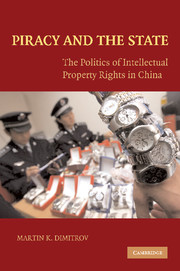Book contents
- Frontmatter
- Contents
- List of Tables
- List of Figures and GIS Maps
- Acknowledgments
- List of Abbreviations
- I INTRODUCTION
- II THE ORGANIZATION OF THE STATE: IPR ENFORCEMENT OPTIONS
- III THE STATE IN ACTION: THE POLITICS OF IPR ENFORCEMENT IN CHINA
- 7 Trademarks: Capricious Enforcement
- 8 Copyrights: Beyond Campaign-Style Enforcement
- 9 Patents: Creating Rationalized Enforcement
- IV CONCLUSION
- Glossary of Selected Chinese Terms
- Index
8 - Copyrights: Beyond Campaign-Style Enforcement
Published online by Cambridge University Press: 06 November 2009
- Frontmatter
- Contents
- List of Tables
- List of Figures and GIS Maps
- Acknowledgments
- List of Abbreviations
- I INTRODUCTION
- II THE ORGANIZATION OF THE STATE: IPR ENFORCEMENT OPTIONS
- III THE STATE IN ACTION: THE POLITICS OF IPR ENFORCEMENT IN CHINA
- 7 Trademarks: Capricious Enforcement
- 8 Copyrights: Beyond Campaign-Style Enforcement
- 9 Patents: Creating Rationalized Enforcement
- IV CONCLUSION
- Glossary of Selected Chinese Terms
- Index
Summary
Anyone visiting China will immediately be struck by the presence of pirated copyrighted materials and by the speed and efficiency of their manufacture. For eight to fifteen yuan (one or two U.S. dollars), DVDs of the most recent Chinese and foreign movies can be obtained simultaneously with their studio release. The same holds for music CDs. The latest versions of business software (e.g., Microsoft Office) and entertainment software (video games) are similarly sold at a fraction of the official retail price. Although in recent years stores that trade in legitimate products have sprung up, piracy has not disappeared. If anything, hawkers of pirated media seem to be even more visible than in the past, sometimes in the unlikeliest of places – on street overpasses in Guangzhou, in upscale foreign restaurants in Beijing, and outside ticket booths at the Badaling section of the Great Wall. Book piracy is thriving as well. When Bill Clinton's autobiography was published in Chinese in 2004, an unauthorized translation also hit the streets, complete with two hundred pages of additional text that promised to give the full details of the president's private life.
Why is the level of copyright piracy so high in China? The fundamental reason for the persistence of piracy is, of course, that it is favored by two strong domestic constituencies: counterfeiters and consumers. If counterfeiters are in favor of piracy because it yields them handsome profits, consumers obviously benefit from access to cheap copyrighted goods. What about the government?
- Type
- Chapter
- Information
- Piracy and the StateThe Politics of Intellectual Property Rights in China, pp. 221 - 248Publisher: Cambridge University PressPrint publication year: 2009

